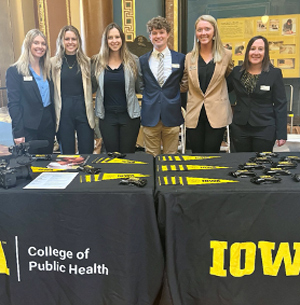Jun 07, 2023
Changing the Narrative — Rural Healthcare Opportunities and the Role of Emerging Leaders
by Kristin D. Wilson, PhD, MHA and Hallie Vonk

We all like an underdog story. Many news stories portray rural healthcare as the underdog as many organizations delivering rural healthcare fight for survival. Yet the story that is being written about rural healthcare is missing a key element. A new narrative is needed to better capture the opportunities that underpin rural healthcare. While much attention has been focused on rural healthcare challenges and disparities, not as much focus has been given to the possibilities for innovation and the role of emerging leaders. Cheering for the underdog is much easier when you know that there is great hope for them to win.
Current Literature — The Good, The Bad, and the Ugly
So where does some of this hope originate? A few studies, such as one from Health Affairs, have focused on the advantages that rural hospitals have over urban hospitals, especially during a pandemic. The survey identified that rural hospitals have more adaptive staff, which allows for cross-training and dexterity. There is also a strong hospital-community relationship that allows rural hospitals to lead the emergency response for their town. Additionally, a collaborative culture and individualized communication aid in developing a resilient workforce that trusts in leadership and feels a sense of purpose in the work they perform. Furthermore, an article from the Center for Health Care Strategies, Inc. recognizes the unique opportunities that are embedded in rural communities and how this can advance the delivery of complex care. For example, rural hospitals serve as "anchor institutions" that aid in maintaining a healthy community and economy. They can call on community members to support a non-traditional workforce to fill the gaps of care and have tremendous potential benefits for use of technology.
These opportunities are starkly contrasted with the fact that there were 136 rural hospital closures from 2010 to 2021 and a record-breaking 19 closures in 2020. Nearly 30% of rural hospitals nationally are also at risk of closure due to persistent financial losses on patient services, low financial reserves, and inadequate revenues to cover their expenses. It costs more for rural hospitals to recruit and retain their workforce and to deliver services to their patients. This puts rural healthcare organizations in a precarious position. Commonly proposed solutions such expanding Medicaid, increasing Medicare reimbursement, or converting all hospitals at risk of closure to Rural Emergency Hospitals are not adequate to address the challenges and disparities present in these communities.
Writing the New Narrative
What does this mean for the future of rural healthcare? While we must recognize the challenges that are present in rural healthcare, there needs to also be a stronger emphasis on the opportunities that are present. Perhaps innovation can be found in rural healthcare's strengths. The greatest asset in rural healthcare is its people, so focusing on leaders, the individuals on which organizations rely for strategic guidance and innovation, is imperative.
The National Rural Health Association (NRHA) understands that leadership is a critical component to tap into the potential of rural health. NRHA CEO Alan Morgan said that "leadership is the single highest predictor of rural hospital success." To act on this statement, NRHA created the Rural Health CEO Certification Program. This program aims to equip rural hospital CEOs with the competencies and skills to address the unique challenges in rural America and to be top-performing CEOs. In addition, the association accepts 10 to 15 individuals who have proven their dedication to improving rural healthcare to be NRHA's Rural Health Fellows. The aim of the intensive training program is to develop a set of leaders who can articulate a clear and compelling vision for the future of rural health and equip these individuals to serve in key leadership roles in the association, advocacy groups, and legislative bodies. Programs such as NRHA's are important for experienced professionals to continue building their skill set to better serve their communities and advance their career. Leaders who have completed the NRHA program can be a great resource for mentoring future rural healthcare leaders. Efforts are also needed to build a pathway to rural healthcare leadership roles by investing in students who are future rural healthcare leaders.
New authors are needed to write this new narrative. Future-focused emerging leaders are critical to the reimagination of rural healthcare and changing the narrative while leveraging the wisdom of those with experience. They can shape a future where the attention is placed on opportunities within rural healthcare in addition to the challenges. Universities, organizations, current leaders, and emerging leaders themselves are acting on the goal of rewriting the story so more people will start to root for the underdog.
Creating a Pipeline of Rural Healthcare Leaders
Creating a pipeline of rural healthcare leaders is an important step for a new narrative to be written. Emerging leaders who are passionate about rural health are being trained and mentored to work in the rural landscape. There are organizations across the country that are equipping future leaders with the necessary skills and competencies to succeed in rural healthcare, and we will highlight two.

The University of Iowa's Master of Health Administration (MHA) program, directed by Dr. Kristin Wilson (one of this article's authors), is one example. The two-year program integrates opportunities to expose students to rural healthcare. In their first year of the program, students visit a rural hospital in Iowa for a day of observation and discussion and meet with the state hospital association, which focuses much of its advocacy on the needs of rural hospitals in the state. This experience is built into the curriculum, which ensures that all students, whether interested in rural healthcare or not, have some understanding of the challenges and opportunities that are present. The curriculum provides integrated examples that directly relate to rural healthcare, and many students also pursue internships or fellowships at rural organizations due to the strong connections that the program has with its alumni. Former graduates of the MHA program serve as mentors to the students and expose them to the vast innerworkings of rural hospital administration. The University of Iowa College of Public Health also houses the Rural Policy Research Institute (RUPRI), which is a national policy research organization. RUPRI provides unbiased, research-based analysis and information on the challenges, needs, and opportunities facing rural communities. Dr. Keith Mueller, director of RUPRI, has allowed many MHA students to serve as graduate research assistants. Through this employment opportunity, students learn about important policies that directly impact rural communities and use this information to help shape their understanding of rural healthcare administration.
Students interested in rural health at the University of Iowa are also encouraged to join the Student Association for Rural Health (SARH). SARH provides students with a place to connect with rural health organizations and leaders through guest speakers and panel discussions, field trips, networking activities, and volunteer opportunities. "It provides a way for students to learn from each other and gives them an opportunity to connect with others who are passionate about rural health," said Dr. Whitney Zahnd, faculty advisor of SARH. Dr. Zahnd, also an assistant professor in the Department of Health Management and Policy, said that the University as a whole is making a significant effort around rural health.
The University of South Carolina's Master of Health Administration program is another example of a program that is equipping students with the necessary skills to be successful rural healthcare leaders. The program is naturally infused with rural health passion — half of the faculty members have experience in rural healthcare or have research focused on that topic. Students also have the opportunity to take a rural health elective course that gives a broad perspective on the services that are offered in rural hospitals, the differences between rural and urban healthcare, and policies that affect rural healthcare. Much attention is given in this class to the different levers that are available for administrators in these spaces to help ensure a robust, stable health infrastructure. Beyond the classroom, students can work as graduate assistants for the South Carolina Office of Rural Health or nearby rural hospitals. Within these experiences, students are exposed to all parts of the health system — administrative duties with the CEO, scrubbing in to observe surgeries, talking with support staff, and many more activities.
If you are looking to get experience within healthcare, there is no better place than rural.
Dr. Melinda Merrell, Clinical Assistant Professor and MHA Program Director who focuses her research on the delivery of healthcare in rural communities, said, "If you are looking to get experience within healthcare, there is no better place than rural." Dr. Merrell further explained that rural healthcare is "an innovation test bed." Unlike urban facilities, leaders in rural hospitals are able to implement changes quickly and efficiently. If their initiatives are not successful, then they can try something else. This characteristic means that leaders can have a significant impact on the communities they serve in a short period of time.
Strong Advocates for Rural Healthcare
Much discussion has centered around what the future of rural healthcare should and will look like. In discerning this new model of care, we need leaders at the table who understand rural healthcare and can inform organizations and policymakers. Regardless of new hospital designations or acquisitions, we need well-trained emerging leaders with an appreciation of the complexities of rural care to be ready to take their seats at this table. National and regional organizations play a critical role in embracing these new leaders and immersing them into the opportunities and challenges within rural communities.
The NRHA's Student Constituency Group is an example of an organization that is helping equip students for a future in rural healthcare. The group is composed of student members across the United States who are the future workforce of rural healthcare. These emerging leaders are in school for various healthcare-related degrees and come together with their peers, educators, administrators, health professionals, and other stakeholders to create a dialogue about rural health. The constituency group currently comprises mostly medical students, so there is a great opportunity for healthcare administration students to collaborate with or join the group.

On the West Coast, the Oregon Rural Practice-based Research Network (ORPRN) is another example of a program that works to advance rural health and expose students to rural health opportunities. One project that ORPRN is actively engaged in is a partnership with the OHSU-PSU School of Public Health. The initiative works to offer valuable educational programming and develop evidence-based practices for the professional public health workforce in Oregon. Another program that ORPRN is associated with is the Campus for Rural Health, which allows students to train in a rural context of care through team-based clinical rotations in community clinics. Dr. Melinda Davis, Interim Director of ORPRN, said that this student pipeline is a "beautiful opportunity to help people stay integrated in their home communities." Kelli Bosak, a Licensed Clinical Social Worker and member of the ORPRN Regional Advisory Board, finds that working in rural health gives healthcare learners and providers the ability to build a broad scope of practice and impact many different needs within their patient populations. ORPRN understands that engaging emerging leaders from all degree programs is critical to a new narrative for rural.

Rural hospital leaders are also preparing future students through mentorship, internships, and fellowship programs. Catherine Hillestad, Chief Executive Officer of MercyOne affiliate Adair County Health System in Iowa, is a young leader herself who found her way to rural healthcare. A graduate of University of Iowa's MHA program, Hillestad never thought that she would pursue rural healthcare opportunities, since she always imagined herself in an urban setting. When she found herself in a rural leadership position due to the encouragement of a mentor, she found a sense of community and an incredible learning experience. "I don't just do typical CEO roles," Hillestad said. "I get to wear many hats, know how every department operates, and have an impact on everyone in the organization." When asked what advice she has for aspiring healthcare leaders who are curious, but maybe wary, of serving in leadership roles for rural organizations, she encourages them to just go for it because there are endless opportunities to learn. She believes entering rural healthcare early in one's career opens many doors as a provider gains a deeper understanding of how all the moving parts within a hospital work together and finds experiences to network with many other high-level leaders. Hillestad credits much of her journey toward a rural healthcare career to a mentor she had early in her career. To further establish this pipeline of rural leadership, Hillestad serves as a mentor for University of Iowa MHA students.
The Future Leaders
The next generation of leaders will be responsible for writing the new narrative for rural healthcare. They will be leading the charge to find ways to face the challenges of rural healthcare but will also give light to the many opportunities. "The future of rural healthcare will require innovation," said emerging leader Johanna Knutson, an MHA candidate and President of SARH at the University of Iowa. Knutson noted that innovation in rural healthcare is going to look different in each community. Successful leaders will learn how to mend the gap between those who are resistant to change and those who are promoters of change within the healthcare system in their communities. Leaders must understand that their work is more than just a job as the decisions they make have a large and lasting impact on the community.

Hallie Vonk (one of this article's authors), first-year MHA student and Co-Chair of SARH, believes that successful leaders must have the understanding that rural healthcare needs to be reimagined by focusing on the strengths that are embedded in its structure. One of rural healthcare's greatest assets is the strong sense of community and collective responsibility that it embodies. This same characteristic of collaboration is the key to its future. Emerging leaders must enter the field with the goal of achieving collaborative partnerships between payers, hospitals, patients, and vendors to deliver quality, sustainable care. Rural healthcare requires leaders who are ready to have a large impact on the organization and entire community. While there are many challenges to overcome, the opportunities for growth and leading impactful change are what is exciting about entering rural healthcare.

From the perspective of Emma Jackson, University of South Carolina MHA candidate and graduate research assistant for the South Carolina Office of Rural Health, rural healthcare requires engaging stakeholders from a variety of sectors because it is only when we bring these different voices to the table that we can advance the collective impact on rural health. "People are really at the heart of healthcare," said Jackson, and she believes the future of rural healthcare will require workforce development. Schools, universities, organizations, and hospitals should continue to create opportunities for students to learn in a rural setting.
Picking Up the Pen
Writing the new narrative of rural healthcare will necessitate advocacy, innovation, appreciation, and collaboration. All stakeholders must come together to advance the new narrative that focuses on the strengths as a way to overcome the challenges. Young, emerging leaders continue to need opportunities to learn about rural healthcare from hands-on experience, hospitals need to invest in creating a student workforce pipeline, and current leaders need to serve as mentors. Regardless of what the future of rural healthcare looks like, we can cheer for this underdog team as the future leadership landscape in rural healthcare will help change the narrative and landscape of rural healthcare.
